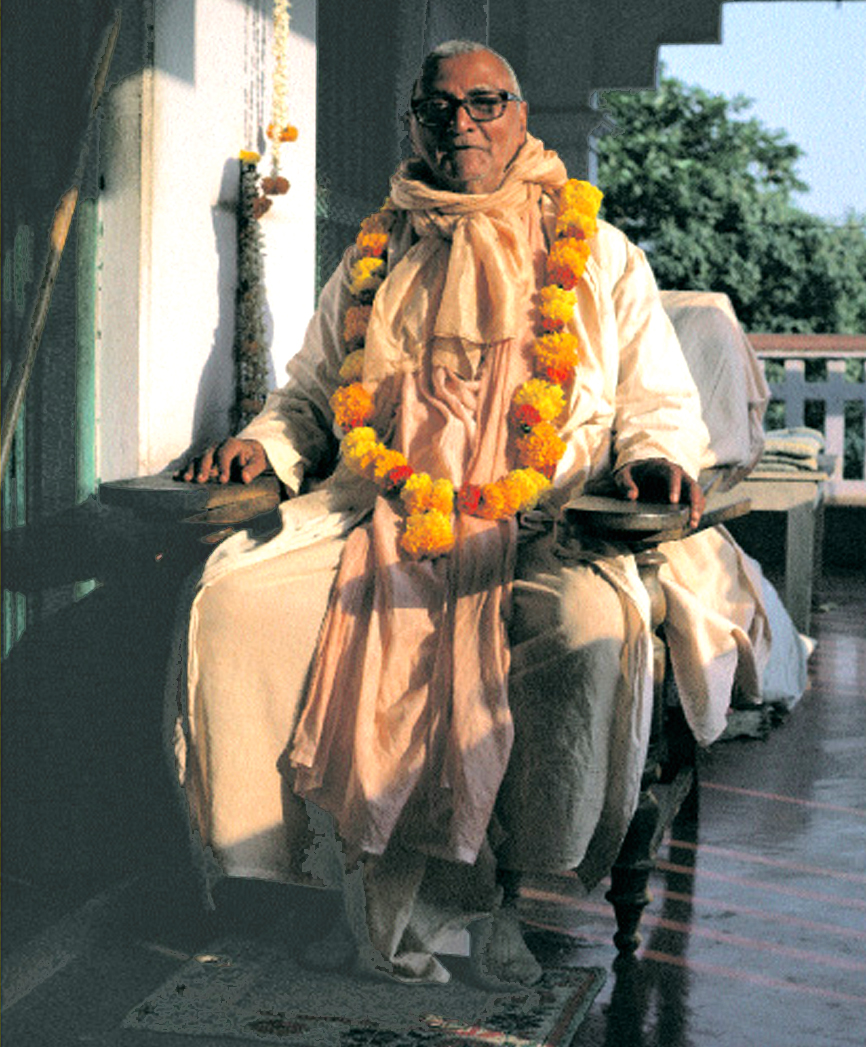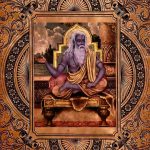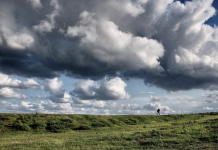 by Srila B.R. Sridhara Maharaja
by Srila B.R. Sridhara Maharaja
His Divine Grace A.C, Bhaktivedanta Swami Prabhupada advised his senior disciples that if the need arose to consult higher spiritual authority after his disappearance, his senior godbrother Srila Sridhara Maharaja should be consulted. On more than one occasion he said, “I consider Srila Sridhara Maharaja to be my siksa-guru, instructing spiritual master, so what to speak of the benefit that others can have from his association.” Just after his disappearance, his senior disciples approached Srila Sridhara Maharaja and asked his advice on how to guide the International Society for K.rsna Consciousness. The following is an excerpt of their conversations.
Devotee: After the departure of our beloved spiritual master, we have come here to offer our respects to you as well as to hear your highly esteemed advice on certain matters, if you’d be kind enough.
Snla Sridhara Maharaja: The disappearance of the spiritual master is mentioned in the sastra with an example. The disciple is like a lotus. The spiritual master is like the water around the lotus, just as in a pond or a lake. Your late gurudeva’s position is like water. And Krsna is like the sun. As long as the lotus is floating on the water, the sun will nourish the lotus. But if the water vanishes, that very sun will burn the lotus. Without water, the Krsna sun will burn the lotus. Without the help of the guru, the disciple is nowhere.
Without Guru, All is Void
Raghunatha Dasa Goswami has said, “In the absence of my gurudeva, Govardhana hill, the representation of Krsna Himself, seems to me just like a big python coming to devour me. And Radha-kunda, the holiest place of divinity of the Gaudiya-sampradaya, seems like a tiger’s mouth coming to devour me. They are giving me so much excitement in the absence of my gurudeva, my dearest and highest spiritual guardian. My gurudeva, who has the most intense affection for me is not here? How can it be? Everything is void. All has vanished with his departure.” Such a deep sense of separation will come in the heart of a sincere disciple.
Once, one of your devotees said in his lecture that separation is the highest realization. I was very happy to hear from his lips that separation (vipralambha ) is the highest attainment. Without separation, nothing else can come to us. The anticipation of meeting Krsna will appear to us as vipralambha, so vipralambha is the most auspicious thing pertaining to Krsna consciousness. And we can have Krsna’s connection also in that separation. So, the safest and most fearless position is vipralambha. If we can stand firm and retain the memory of gurudeva in his separation, then we will have passed the highest test.
Devotee: In our spiritual master’s lifetime he was seen as the absolute authority above all, including our governing body commission. How should we understand the position of the new spiritual masters and their relationships with their godbrothers and disciples?
Srila Sridhara Maharaja: The position of the acarya with his disciples must be absolute; with his disciples, he will have absolute authority. Still, he must be careful not to become mad with authority. Authority is a part of pratistha, name and fame. There is also another tendency. When a guru comes in connection with vatsalya-rasa, the mood of guardianship over his disciples, his friendly relation with the godbrothers decreases, some special discrimination arises and stealthily he is drawn to his disciples, indifferently neglecting his connection with his godbrothers. This tendency is sure to come, and it is difficult to keep up the balance. So, the brothers are neglected, and the sons get more attention. In this way the guru becomes partial. When he comes in close connection with their disciples, they have freedom; he is given an opportunity of absolute mastership. In that position it is very difficult to keep up his purity because of that temptation; there is the possibility of going down from the plane of acarya.
Guru is All in All
Autocracy and democracy do not go well together. Our system is autocratic. Guru is all in all. Our submission to guru is unconditional. If a disciple sees that his guru’s powers are being restricted by other Vaisnavas, it will create a great disturbance in his mind, a disturbance to his absolute faith in his guru. This is where the Krsna conception of Godhead comes to our relief. He whom we think to be supreme-most-Krsna–Yasoda is whipping him. He is carrying Nanda’s shoes on his head, and he is the Supreme Personality of Godhead. In this way we can adjust everything. Both the absolute faith and the relative position of the non-absolute–these two things should be harmonized.
The guru should be recognized by impartial judgement. Everyone thinks that his own mother is the most affectionate. But when a comparison is drawn between two mothers to see who is more affectionate, an impartial criterion will be applied. This is called tatastha-vicara: an impartial comparison of relative and absolute considerations. When the two are weighed, the absolute calculation will always have the greater value.
The position of acarya is very intricate. It is very difficult to bring an acarya under rule. You see, that is our practical experience. You please hear and note this. The position of acarya is a relative thing, and the position of the disciple is also relative, just like the relationship between mother and child, father and son, wife and husband. Although to his godbrothers a guru will be seen in a relative position, to his disciple, the guru is absolute. So to adjust between the relative and absolute is a difficult thing; it is an eternal problem. Even in krsna-li1a there is enmity between madhurya-rasa and vatsalya-rasa, but when the absolute consideration comes, both rasas must be included within the fold.
Guru: More than God
To a disciple, his guru’s position is Supreme, even more than God. This is said in the scriptures. The guru is more near and dear to us than God Himself. God has many things to deal with, but guru is concerned only with my welfare. The guru’s position is more helpful to the disciple than God. If within your society, you want a natural growth of the disciple’s regard for the guru and the Absolute Truth, such room must be allowed in your constitution, if the constitution is to live at all.
Law is not everything. The law of your society should be accommodating to nurture divine sentiment, otherwise it is no law. Law should promote faith. Sastra’s jurisdiction is limited. It is meant only to promote love, and when love comes, it will be free; smooth, harmonious working is possible only in the area of love. Srila Rupa Goswami says that vaidhi-bhakti, devotion under the guidance of sastra, or laws and rules, is helpful only to a certain extent. It will help the inner awakening of love and affection and then retire. Law will retire, giving room to the spontaneous flow of love. Law is necessary, especially in the lower stages, but it should make room for free movement in the relationship. Freedom is the highest thing. Free service is raga-marga, and that is service proper, not service that is regulated and coerced and pressed by law. That is not service. Our aim is Vrndavana. So, we want free service. Without freedom, service is not valuable. Forced labor is no labor; a labor of love is required. And that is the thing for which all are out. Let us essentially think that we are all out not only for the constitution, but the thing for which the constitution has been made; we are out for that high object of life: divine love. The constitution should promote that aim. With this feeling we should go on. Newcomers are coming with their faith, and their faith should be encouraged and also adjusted so that the faith of one person may not disturb another.
Messiahs of Free Faith
No law should go to limit or control the acarya, for then the sraddha of the disciple will vanish, and all will be a mechanized machine. Rather the whole thing will be reduced to matter. We are the messiahs of developing free internal faith in the Lord. Faith, that is to be nurtured. That sort of creeper should be planted in the garden of the heart and watered and nourished. The very characteristic of faith must not be lost by infringement, by over-pressure of the laws and rules. The free flow of the heart must be kept. The movement of Sri Caitanya Mahaprabhu is more of heart than of intellect. We should always consider this. The intellect must not check the free flow of the heart. We must always remember that. Free love and free faith are the only things, the most valuable things for which we have come out of our own house and joined the mission. This purity of purpose should always be kept intact. Of course, some help from law and regulation is necessary, but not so much as to check the growth of our vitality. We must promote vitality. The real spirit, the real purpose of the mission should be given first hand. And lenient dealings are necessary amongst you. It is said, “If the tongue is cut by the tooth, should I pull out the tooth?” You are one organic whole; your dealings should not be such that the forgiveness of love is forgotten. The giving of love will conquer more than the giving of law. What is the need of so much formality and fashion, when ultimately we are all servants of the Lord?
The acarya faces two dangers. The first is partiality. Partiality means full freedom with his disciples. This relationship is also more attractive to him. The second danger is deviation. So, deviation and partiality-these two things can take down the acarya. These are the two enemies of an acarya. And one who takes that position must be particularly careful about these things. The position of an acarya is dangerous. It is full of temptations. Therefore, a strong, sincere indomitable desire for the upper aspirations of Krsna consciousness is the indispensable necessity in an acarya. Otherwise, he can’t maintain his position. He will go down. He has become master and will think, “I am the master of all I survey.” In a particular circle, he is monarch. And monarchy can bring madness. That is a great temptation. If one is not sufficiently conscious of this fact, he will not be able to maintain his position. For one who has monarchy over men and money, it is very difficult to maintain a position as a servitor. The ego of mastership which is generally found within all of us comes to attack the guru. After all, we are wandering in the land of exploitation. Therefore, we should be very wakeful and scrutinizing in our self analysis. The general symptom of health is that the more one will go up, the more he will think, “I am going down.” This indirect method of measurement may be applied to measure our internal advancement. Externally one may maintain a superior position, but internally he should always be thinking, “O my Lord! I am in want. Give more grace to me! I can’t maintain my position.”
Money, Women, and Fame
It is a great misfortune if a Vaisnava guru strays from the line. It is rare, but occasionally it may be found. Generally the symptoms of deviation fall into three different classes: kanaka, kamini, and pratistha: money, women, and reputation. First, a guru loses his attraction for his own guru and sastra-upadesa the advice of the sastra. Then, what he previously expressed, quoting the scriptures and the words of his own guru, gradually becomes absent in him. His attraction for the higher thing fades. That is pratistha, prestige. Kanaka, kamini, pratistha: money, women, and name and fame-these are the three tests to be put everywhere to see whether one is a sadhu or not, or what degree of sadhu he is. The first thing is deviation from his higher gurus. That should be detected. That is pratistha, pride.
Then, he will show more tendency to amass money and not to spend it. Money may be collected, but that must be distributed for the service of the sampradaya, for the service of the Vaisnavas. But amassing money-this is the second sign of deviation. The third is attraction towards the ladies. Of course, he may come in connection with money and women and also with the honor from his disciples. That is also necessary, but only for the purpose of divine object, divine aim, not for himself. But if we can detect that he is utilizing all these things for his personal interest and not for the cause of the sampradaya, then we should be careful.
In the beginning, we may neglect some occasional problems; some instances of these kinds of deviations may be ignored. But if we find that they are becoming more prevalent, then we must inspect the situation carefully. And we are to bring it to persons similar to my position. And after consultation, we can take the matter to higher sources and consult other acaryas who are reliable. When we find that what appeared to us first in a small way is real, injurious, and of a big magnitude, and that our spiritual master is going down, then we must act to save ourselves. We must try to take steps which may save us from that epidemic contamination. We must try to save ourselves. And we must also try to save others who might fall prey to the same exploitation as us. That must be done in all sincerity. There is the possibility; it is mentioned in the sastras and so many practical examples are also there. So, we must not make progress in a slumber, but we must go forward with our eyes always opened.
Abandoning Bogus Gurus
Devotee: If the initiating guru falls down from the path, what should the disciple do?
Srila Sridhara Maharaja: He may take shelter of the holy name of Krsna again and wait for some time. If the guru was at first a sincere disiciple of his spiritual master, and now as a result of some offenses he is being neglected by his guru, he may be led astray for some time. But he may return to the standard again. Still, it is said in the Mahabharata (Udyoga-parva 179.25):
guror apy avaliptasya
karyakaryam ajanatah
utpatha-prathipannasya
parityago vidhiyate
“A guru who does not know what is to be done and what is not to be done, who has left the path of devotional service, should be abandoned.” This is found in Bhisma’s statement in the Mahabharata. Bhisma is one of the twelve mahajanas, and this is his statement to his astra-guru, Parasurama.
Jiva Goswami says that if the guru goes astray he should be abandoned, but there may be circumstances where, by the inconceivable desire of Krsna, the guru may go astray for a time and then come back again. In that case, the disciple should wait for some time. It is very unfortunate for the disciple when such things happen. You will find this elaborately dealt with in the Harinama-cintamani of Srila Bhaktivinoda Thakura. If a son leaves home and disobeys his father, the father may be indifferent to him; he may exclude him from the will. If, however, the son returns after some time and is again obedient, then he may collect his inheritance. In a similar way, a spiritual master may disobey his guru, and then his guru may be indifferent to him for some time, but again if he sets himself right, he will not be disinherited. This is explained in Bhagavad-gita (api cet suduracaro ). So we should not deal very abruptly with these unfortunate incidents, but we should wait and see. Everything must be done judiciously.
In trying to understand the relationships between guru and godbrother and guru and disciple, we will find very subtle points of sentiment. Just as when Krsna entered into the arena of Kamsa, he appeared differently to different persons, the disciples will have one view of their guru and his godbrothers will have another view and disposition. The disciples of a genuine guru will see their guru as being with Krsna, but that may not be seen to his godbrothers. In madhurya-rasa, Krsna is seen in one way, and in vatsalya-rasa, Mother Yasoda sees him in another way. The servants see him in another way. The risis like Gargamuni will see him in another way. As Krsna likes to show himself, he will be seen.
You may see the guru in your own way, but still, you’ll have to behave in such a way that the newcomer’s faith will not be disturbed. The newcomers should always be encouraged, because it is very difficult for a fallen soul to collect his faith and regard and offer it to the guru. It should be our concern that they collect their maximum regard and offer it to the guru. On the other hand, I may have my own conception about my godbrother. I may foster that within my heart. As much as possible I should try not to disturb his disciples. If, unfortunately, an acarya falls, and proves himself to be lacking in that capacity, then if that comes to a sufficient degree, some steps may be taken; we may have to take some unhappy action. But let God save us from that disastrous condihon. That should be our feeling.
Otherwise, as long as possible, the rank should be respected. Both the relative and absolute consideration- side by side. The disciples should be encouraged by the relative consideration mostly. And godbrothers will have more feel for the absolute consideration. But still, they shouldn’t disturb the newcomers in their premier position. Even if you think that the person performing the function of acarya is lower in qualification (adhikara ) than you, still you should formally give some special honor to him because he is in that position. The son may be the judge, and the father may be the lawyer, but the father must give respect to the son. He must give respect to the chair. So that kind of adjustment should be kept in the mission. When you are alone, the acarya brother and his non-acarya brother can mix freely. You can give a slap to his face. But when publicly amongst his disciples, you must show that sort of behavior. Respectful conduct should be publicly maintained to keep up the peace of the mission.
Vyasa…May Not Know
Devotee: Although the disciples should regard the guru as absolute and of the highest level of spiritual attainment, how should he view his own position?
Sridhara Maharaja: Sridhara Swami wrote a commentary on the Srimad-Bhagavatam. It was a little different from the previous commentaries, so the scholars, especially the Sankarites, refused to accept that commentary as universal. They put it to the test. They left the commentary in the temple of Visvanatha, Lord Siva, and agreed that if he accepted the commentary, they would all accept. Then, from the Siva temple, this verse was revealed: aham vedmi suko vetti, vyaso vetti na vetti va. “The real purpose of the Srimad-Bhagavatam is very difficult to conceive,” Lord Siva says. “I know the true purpose of Bhagavatam; Sukadeva, the son of the disciple of Vyasadeva, knows it thoroughly, and the author of the Bhagavatam, Srila Vyasadeva, may or may not know the meaning.
When teaching Sanatana Goswami, Mahaprabhu said, “Sanatana, Krsna is going to give His kindness to you through me. I am talking to you like a madman. I feel many things are passing through me to you. But I do not know that I myself have that thing.” It is possible. It is wonderful, but still we find it there. It is not unreasonable, although it is not understandable.
You see, when the Second World War broke out, in Dalhousie Square in Calcutta, there was a popular government poster. A military uniform was painted on the wall. Beneath it was a saying, “Just wear this uniform, and the uniform will show you what you must do.” So, when a sincere man has taken a particular charge, he will somehow find out what are the duties of his post. He is sincere. And God will help. God helps those who help themselves. You have taken the charge, and that charge has come only as a chance, but there is some underground link. Then if you try to go on, help will come to you. He’s not a cheat. You have sincerely taken this responsibility, as given to you by your master, and the master is not a cheat. He will come to help you with all his might, saying, “Do this. I’m helping; I am at your back. When we are all sincere, things will happen like this.
Source: “Sri Guru and His Grace” by Srila B.R. Sridhara Maharaja










